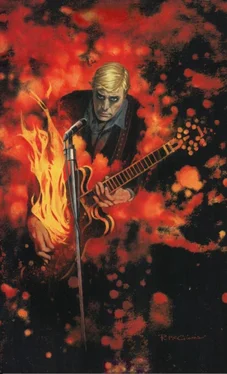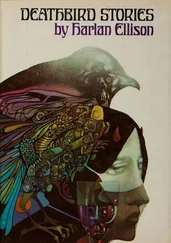Within a month “I Don’t Know You Anymore” had passed the million mark. Stag got his first gold record, and not at all oddly, the color reflected back from it by his eyes was also gold. Everything he touched with his vocal cords turned to gold. It was not unusual for a hard-pushed talent to get one big hit, perhaps follow it with a second, not quite as socko, but it was obvious this was not the case with Stag Preston.
He was not a flash in anyone’s pan. He was a solid property, a talent with something new, something essential, something special. His second record was done by Hollywood songwriter Sammy Fain, the title number from an “A” picture, The
Thundering Land (with Burl Ives, Robert Mitchum, Sal Mineo,
Shirley MacLaine and a cast of thousands—mostly nonentities). The flick grossed several million, and not a little of its success was due to Stag Preston. His rendition of “The Thundering Land” b/w “The Midas Touch” (a title Shelly considered apropos as all hell) netted him a second gold record. It passed a million and was last seen heading out of sight.
ABC-Paramount had come through with the best deal—or perhaps it was merely that Sid Feller had the sharpest eye for new talent; Shelly suspected that was why he had the cleanest contact lenses in town—and they were packaging him with four-color sleeves on his 45s, with Frank Wess backings and a promotional sweep unlike anything since Kim Novak had been shoved down an unsuspecting populace’s throat.
The Brill Building was humming with word of Stag’s drawing power. The sheet music operators and the sideline grifters all wanted their taste. The better mousetrap had been built, and Tin Pan Alley was beating a polished Italian loafer path to Colonel Jack Freeport’s door.
Inside that door, Shelly Morgenstern, Colonel Jack Freeport, and Stag Preston held court.
The payola (now underground more than ever, discreetly delivered in white legal-size envelopes bought in Woolworth’s) spread like a fine slick of oil on troubled waters; and like other troubled waters, they parted to permit Stag Preston’s passage through to the Promised Land.
His first album, Let Me Sing To You , went onto the Top Ten in its third week and got rave reviews not only from Cash Box, Variety and Billboard , but Nat Hentoff and Ralph Gleason (the former of Jazz Review , the latter of the syndicated column “The Rhythm Section") both found ethnic roots of true blues singing in Stag’s presentation, and lauded him openly, thus interesting the jazz audience.
The following month Down Beat and Metronome each ran an article of analytical discussion anent Stag Preston’s emergence as a true jazz singer, his value as the first jazz-oriented pop singer since Mathis had gone bland, and how he was saying things in the jazz idiom. They decided he had “soul.”
The fires were being stoked high.
Music Vendor referred to Stag Preston as “the hottest thing since sliced bread.”
Shelly caught the Colonel dry-washing his hands like a deranged miser on several occasions. It was Moneysville-On-Thames for one and all.
Stag had begun referring to Freeport as The Man.
Stag’s up-tempo version of “Let Me Call You Sweetheart” was pushed like a yak-cart going uphill on every DJ show, jukebox, tv dance program, high school prom or sock hop, every record shop in the country.
Let Me Sing To You passed two million. Stag was now stacking his gold records, biting his golden fingernails and calling Shelly, “Hey, you.”
“Let Me Call You Sweetheart” went into orbit at two million twelve, and Ed Sullivan called for Stag to appear on the “See America With Ed Sullivan” series, the show emanating from Manhattan. The Colonel, realizing the Big Time came no Bigger than this, made the deal and won Stag a close-out spot on the program. Trendex went out of its mind reporting that an estimated 23.4% of the viewing audience had switched channels to catch the second half of the Sullivan extravaganza, even if they had been elsewhere for the first half.
Arbitron, Pulse, Nielsen and Hooper clocked similar phenomena and Stag Preston’s stock hiccuped into the blue chip strata. Freeport cackled and blushed and clapped his hands in childish glee as he hung up on one agent after another.
“Jackals startin’ to suck around real good now, Shelly,” he commented. Stag Preston was sewed up, and there was no room for a share-the-wealth policy.
Stag’s tv appearances were carefully kept to a minimum. Overexposure was the last disease Freeport wanted Stag to catch. Leukemia, but not overexposure.
There is, however, exposure … and exposure.
In the night scene, abruptly, Stag Preston became a familiar sight. Whether it was dinner at The Four Seasons, The Forum of the Twelve Caesars, the Chateaubriand or The Colony … drinks at Sardi’s (E and/or W), The Plaza, or The St. Moritz … champagne breakfasts at Rumpelmayers and about 1:00 PM a drink-breakfast at P.J. Clark’s … The Blue Angel, Bon Soir, The Living Room … the Copa, the Latin Quarter, El Morocco, the Waldorf’s Starlight Roof … the Jazz Gallery, Five Spot, the Showplace to catch Mingus and his group … Lindy’s, the Stage Deli … wherever it was, wherever the hipsters congregated … Stag Preston’s face was as much a fixture as the outstretched tip plate (with three quarters thereon) of the hat-check chick.
He found no difficulty in dating. It meant not only a juicy item in the columns to be seen with the scintillant young star, but personally Stag had that indefinable air that marked him unquestionably heterosexual, male, a real guy. There were no rumors—no matter how malicious the speaker—that Stag was anything but broad-happy. There were, however, a few murmurs that he might be, just a teeny bit, too broad-happy. Yet if such rumors were grounded in fact, it seemed to make no difference to the hordes of models, pseudo-models, career girls, pseudo-career girls, visiting starlets and call girls who made it their business to be seen in his company.
Now that the career-building had settled down somewhat, Shelly found he was able to relax.
The money was coming in nicely. He paid off the balance on the Mercedes, had it rebored and tuned, had the six assorted scrapes and scratches on its gleaming black hide repaired, and took it out on the Taconic for a run. He purposely opened it full-throat and allowed a growler to run him to the curb. He even paid the speeding ticket—with a grin that annoyed not only the prowl cop but the cherubic justice of the peace who charged him. For once, the money didn’t matter.
Shelly Morgenstern had hitched his checkbook to a star named Stag Preston.
But like any star—as seen through a cloudy atmosphere— the twinkle was merely an erratic flickering.
At first the flickerings were faint, mere ghosts of what was to come. They were faint, but bothersome for all that. It began to get to Shelly the second night he had returned to staying with Carlene.
It was never hard to go back to Carlene. That was the trouble; it was like getting hooked on junk. The first one or three were easy-come-easy-go. Then a half dozen because it was chuckles. Then another one because it was wanted … who wanted? Oh, yeah, I wanted. And who am I?
The answer comes back as down a long, empty corridor—
You are the hooked man, man.
That was how it was, going back to Carlene.
One of the trappings of seeming affluence, Shelly had “acquired” Carlene almost as though she had been the prize in the Cracker Jack box. After his first big touch with a television promotion outfit (a lofty term for a sotto voce organization who arranged plugs on-screen for payola), he had come into the sphere of influence of Colonel Jack Freeport and one day, almost as though ordered by the stock number, Carlene had appeared in his newly furnished apartment. She had stayed on, had moved in, had lived with Shelly without past or future—only with a non-demanding present.
Читать дальше












